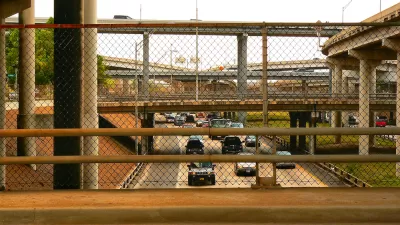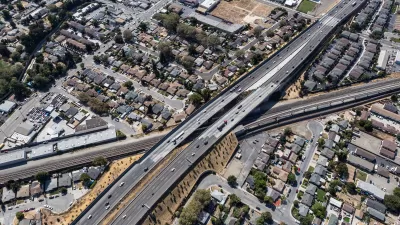Despite calls to center equity in infrastructure projects, highway construction and expansion still disproportionately impacts communities of color, according to a Los Angeles Times investigation.

Despite the well-documented negative impacts of highway construction on Black and brown neighborhoods and the growing influence of the highway removal movement, write Liam Dillon and Ben Poston, "a Los Angeles Times investigation has found that widenings, extensions and other freeway construction continue to take a significant toll on communities even now."
The investigation found that over 200,000 people have lost their homes in the last three decades, with the real number projected to be much higher. According to the article, "a review of records detailing some of the country’s largest highway projects shows that expansions of existing freeways through cities have inflicted a second round of dislocation and disruption on largely Black and now Latino communities as well."
Dillon and Poston detail some of the current or recently completed projects that are still displacing communities of color in cities including Houston, Tampa, and Gulfport, Mississippi. Around the country, projects like Shreveport's planned Interstate 49 connector project continue to threaten historic Black neighborhoods even as advocates call for a focus on equity in infrastructure projects.
The article notes that "[t]oday, displaced families receive substantial financial assistance to find new housing, a marked contrast with the earlier era of highway construction when they often got little in return for their loss." Still, many residents don't want to relocate, and critics of highway expansion point out that wider roads also contribute to climate change and reduce urban air quality. Although the Biden administration has advocated for less highway construction, the recently passed infrastructure bill provides $350 billion in road funding which could be used for new or expanded freeways.
FULL STORY: Freeways force out residents in communities of color — again

Planetizen Federal Action Tracker
A weekly monitor of how Trump’s orders and actions are impacting planners and planning in America.

Chicago’s Ghost Rails
Just beneath the surface of the modern city lie the remnants of its expansive early 20th-century streetcar system.

San Antonio and Austin are Fusing Into one Massive Megaregion
The region spanning the two central Texas cities is growing fast, posing challenges for local infrastructure and water supplies.

Since Zion's Shuttles Went Electric “The Smog is Gone”
Visitors to Zion National Park can enjoy the canyon via the nation’s first fully electric park shuttle system.

Trump Distributing DOT Safety Funds at 1/10 Rate of Biden
Funds for Safe Streets and other transportation safety and equity programs are being held up by administrative reviews and conflicts with the Trump administration’s priorities.

German Cities Subsidize Taxis for Women Amid Wave of Violence
Free or low-cost taxi rides can help women navigate cities more safely, but critics say the programs don't address the root causes of violence against women.
Urban Design for Planners 1: Software Tools
This six-course series explores essential urban design concepts using open source software and equips planners with the tools they need to participate fully in the urban design process.
Planning for Universal Design
Learn the tools for implementing Universal Design in planning regulations.
planning NEXT
Appalachian Highlands Housing Partners
Mpact (founded as Rail~Volution)
City of Camden Redevelopment Agency
City of Astoria
City of Portland
City of Laramie





























